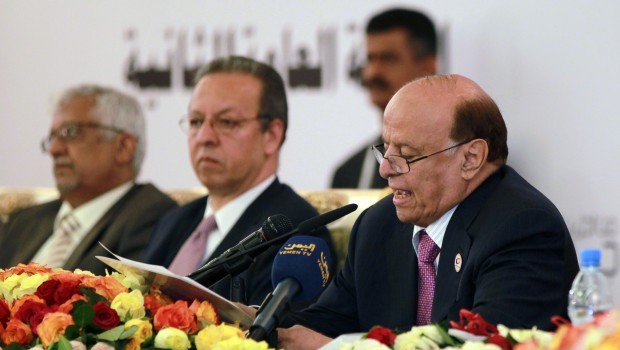
Yemen’s President Abd Rabbo Mansour Hadi speaks during the opening session of the second national dialogue conference in the Yemeni capital, Sana’a on June 8, 2013. (AFP PHOTO/ MOHAMMED HUWAIS)
Sana’a, Asharq Al-Awsat—An agreement has been reached on key issues in the relationship between Southern and Northern regions of Yemen and the future of its political system, say sources in the country.
The sources, speaking on condition of anonymity, told Asharq Al-Awsat that the UN envoy to Yemen, Jamal Benomar, has received a document outlining an agreement ratified by the 8+8 Solutions sub-Committee, which is part of the Southern Issue Working Group in the country’s National Dialogue Conference (NDC).
The issue of power-sharing between the north of Yemen and the more restive south, formerly separate countries, and the distribution of resources between them has been a major sticking-point in attempts to resolve the country’s lingering economic and political problems.
The sources said the agreement stipulates the establishment of Yemen as a federal republic, without specifying the number of states as yet. It also stipulates that the sharing of natural resources, which it says belong to the Yemeni people as a whole, will be done with a special dispensation for the region that produces the resources “according to the federal law.”
They added that it had also been agreed that Southern Yemenis will be offered 50 percent of executive and legislative posts in the national parliament and Shura councils, as well as the county’s Supreme Judicial Council.
With a few days remaining before the conclusion of the National Dialogue Conference–which started on March 18 and will end on September 18—sources at the conference said that the possibility of extending it until the end of the month was under consideration.
They said the next few days would be decisive for the NDC, at a time when the UN envoy was making every effort to bring the conference’s working groups together, especially the Southern Issue Working Group and its 8+8 Solutions sub-committee, in addition to the Sa’adah Working Group.
Meanwhile, a leading figure in the Joint Meeting Parties coalition criticized former president Ali Abdullah Saleh’s party, the General People’s Congress (GPC), for threatening to reject an extension to the current transitional period.
Saeed Shamsan, the head of the political department of the Yemeni Reform Rally—also known as Al-Islah—one of the most prominent members of the Joint Meeting Parties coalition, said: “The interference of parties outside the National Dialogue Conference aims at causing disruption, especially as we are in the last days of the conference.”
The political crisis has worsened in Yemen following the rejection by the former president’s party of the extension to the current transitional period, threatening the failure of extension plans. The Joint Meeting Parties coalition, which consists of five members, shares government portfolios with the GPC, according to the political settlement and the Gulf initiative agreed in the wake of Saleh’s resignation in the face of mass protests.
Shamsan told Asharq Al-Awsat that “talks about the subject of a constituent transitional period should take place within the frameworks of the NDC, and include the representatives of all the parties involved, not through partisan statements from outside dialogue.” He added that the GPC’s rejection of, and its stance on this issue, are a result of internal differences between its leaders.
Shamsan alleged that the GPC’s stance is the product of score-settling within the party, which he said was suffering from stark internal divisions. He called on the GPC to present its point of view through their representatives at the NDC, adding that “talking about a transitional period needs discussion by all parties and will not be ratified without national consensus in the general assembly of the NDC, because it is the party with the power to discuss and ratify it.”
Shamsan announced that his party changed its position on the form of the state. He said, “We presented a vision to the NDC of the decentralized system, but only through discussions within the bodies of the NDC, and we see that there is a leaning towards a federal state with a number of regions, and our current vision is for five to seven regions.”
He also reiterated “the Yemeni Reform Rally’s commitment to respect and implement all decisions of the NDC, which is laying the foundation for a new phase, and a new state.”
In another development, local sources said “security forces foiled two car-bomb attacks in the Rada’ area of Baydaa Province, among a number of other terrorist attacks in several Yemeni provinces, which targeted police, intelligence and army forces.” The Manaseh area of Baydaa has also been the scene of a number of American drone attacks which killed some of the most wanted members of Al-Qaeda in that region.
Hamdan Al-Ribhi also contributed to reporting
